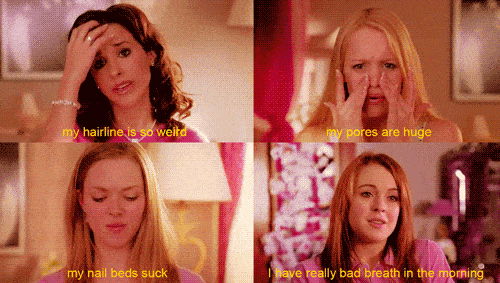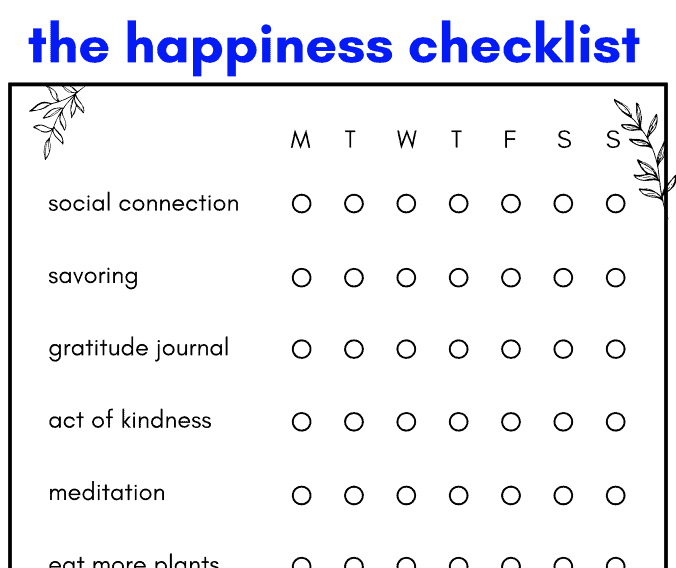Here is a positive psychology research deep dive with facts and recommendations on how to be happy and live your best life! There is an accompanying PDF with a habit tracker checklist as well as some tips on building lasting habits. I sincerely hope these tricks will help you as much as they’ve helped me. Watch the video here:
We spend years, sometimes a lifetime, chasing things that won’t really make us happy. The problem is, we’re really bad at predicting what brings happiness…so, instead of wasting our time, why don’t we just ask science?
Fortunately, the field of positive psychology is filled with research on these topics and today we’ll go over some of the most important findings. I'll also share a PDF where you can find a habit tracking checklist and habit building tips (e.g. stacking, implementation intentions, etc.)—so that it’ll be easier for you to make lasting changes moving forward. Although what makes someone happy can vary wildly (for instance, using one's strengths can increase happiness), these basics are likely universal.
What is Happiness?
I really like this definition:
"The experience of joy, contentment, or positive well-being, combined with a sense that one’s life is good, meaningful, and worthwhile."
Sonja Lyubomirsky
This captures the positive emotions that are often fleeting, as well as the sense of a deeper life purpose—both the hedonic and the eudaimonic. What’s important to know is that these fleeting emotions and the sense of meaning often enhance each other yet the distinction is still important.
Chapter 1: Things That May Not Make You Much Happier
I. Money
There are quite a few surprising facts in this category, but let’s start with the most controversial one. Money. According to the famous 2010 study conducted by Nobel-prize winning economists Kahneman and Deaton, emotional wellbeing rises with income, but only up until your salary reaches $75,000 USD—or if we factor in inflation—that's $89,117 USD in 2020. Of course, these values are location-dependent; meaning that $75,000 in the Bay Area of the U.S. will not go as far as it might in Chiang Mai, Thailand.
At first glance, this trend looks like the law of diminishing returns. However, there is a distinction. What’s often missed when people refer to this popular study is the part about perceived life satisfaction—referred to in this study as "ladder". That variable just seems to continue to increase as you make more and more. There are other studies that conclude otherwise, but Kahneman and Deaton believe that to be a consequence of plotting wellbeing measures against income in dollars rather than using a logarithmic scale of income since we tend to perceive changes more accurately in percentages, not in their absolute amounts (Weber's Law).
When plotted against log income, life evaluation rises steadily. Emotional well-being also rises with log income, but there is no further progress beyond an annual income of ∼$75,000.
Kahneman, D., & Deaton, A. (2010). High income improves evaluation of life but not emotional well-being [Abstract]. Proceedings of the National Academy of Sciences, 107(38).
Furthermore, predictably, low income exacerbates hardships and decreases happiness.
My takeaway from the research in this area was to focus on making that minimum amount as well as having a good investment plan, and not obsessing about the rest. Becoming a multi-millionaire would probably bring me a greater sense of accomplishment and life satisfaction, but it really isn’t my priority. Mainly because there are other avenues to reach higher life satisfaction with much less stress and more certainty.
You may disagree, perhaps you have goals to retire early and volunteer, or maybe you have more Stoic principles and you believe you don’t much money at all. But only you can make that choice for yourself and hopefully being informed about the possible outcomes will help.
It is not the man who has too little, but the man who craves more, that is poor.
Seneca
II. Looks
Something else that many people believe will grant us happiness is our looks. We obsess over our weights, cup size, hairlines, pores, nailbeds… the list never ends.

But you might be glad to find out that research suggests that improving your physical features doesn’t necessarily correlate with more happiness. The same even goes for losing weight loss:
Weight loss over four years in initially healthy overweight/obese older adults was associated with reduction in cardio-metabolic risk but no psychological benefit, even when changes in health and life stresses were accounted for. These results highlight the need to investigate the emotional consequences of weight loss.
Jackson, S. E., Steptoe, A., Beeken, R. J., Kivimaki, M., & Wardle, J. (2014). Psychological Changes following Weight Loss in Overweight and Obese Adults: A Prospective Cohort Study.
Although I’m sure being a 10 is a privilege and would open many doors, at least now we know that changing our own appearance will not have a considerable effect on long term life satisfaction. Might as well just be kinder to yourself in the mirror next time.
III. Things
Along the same vein, having cool things like a big house with a nice pool, a high-end car, or the latest and greatest sneakers don’t seem to contribute to happiness either. In fact, the research suggests that concentrating on all these things you want and being materialistic decreases your wellbeing.
The problem is that you get used to these things, and the hedonic treadmill makes you want an even bigger house and an even better wardrobe. So instead, try focusing on investing in meaningful experiences rather than materials.
IV. Does Finding "the One" Make a Difference?
I was really surprised to find out that research in this area suggests that people who find a long-term partner are initially happier for a few years, but they then go back to their baseline levels. It sounds like the honeymoon phase is real— but it’s likely that you’ll only be as happy with your partner as you were before you met them.
Chapter 2: What You Need to Focus on to Be Happy
Now that we got some misconceptions out of the way, let’s take a look at what we should be focusing on for a happier life.
I. Social Connection
This one is probably the most important tip you may ever learn about happiness. The research suggests that for extraverts and introverts alike, being socially connected makes us happier. Every interaction counts. Perhaps you dislike small talk as many others do, but research suggests that even superficial interactions can give you a boost in your mood.
Of course, this is much harder in 2020 during these strange times, but if you can, make the effort to seek out more social connection. In normal times this can look like striking up a conversation with a stranger on the metro, grabbing lunch with a friend, or asking the barista what made them smile that day. And while physically distancing, you can set up Zoom calls with your friends and family, or propose a virtual water cooler meeting with your coworkers where you’re just talking without an agenda as you normally would in the office.
If there's no one you're that close to or if you no longer feel connected to your current social circle, make an effort to build new relationships. While we can't make old friends today, the opportunity cost of long-term loneliness and lack of intimacy is quite significant for our wellbeing.
Lastly, I came across an interesting study that hypothesized how focusing on "becoming happier" may increase loneliness. This is a catch-22 situation through and through, I think mainly because most people aren't aware that social connection is integral to happiness and because being too self-focused (as is the norm in many Western societies) can ironically be detrimental to our wellbeing. The next section might help with that.
II. Kindness
As we already established, exhibiting pro-social behaviors like kindness can make you very happy. From an evolutionary lens, this makes perfect sense because generally, doing good for others also strengthens your social connection.
You may want to consider committing to doing at least one random act of kindness a day, a week, or whatever timeframe works for you to build it into your routine. Kindness can look like volunteering your time or donating blood or money—but you could also simply send someone a thank you note or give someone a compliment.
III. Savoring (Life's Delights)
This is the tagline of Aegean Delight for a reason. In addition to savoring delicious plant-based foods, my goal is also to promote making an effort to savor life in general. This basically means being aware of and really appreciating the good things as they’re happening, by stepping out of your experience.
The practice of savoring keeps you right here in the moment, it increases gratitude and impedes hedonic adaptation. So to put this into practice, next time you’re having a positive experience, stop and analyze what about that moment makes you happy. Afterwards, feel free to snap a photo if you want a vivid memory of it to look back on—but don’t worry about posting it on social media.
IV. Gratitude
I’m sure you’ve heard of the benefits of gratitude before. It can sound cringe-worthy, but try keeping a gratitude journal and write 5 things on it for 5 minutes every day. This journal can be a nice notebook, or you can do it digitally. I love using Evernote because it's very convenient.
Journaling about the good things in life will probably feel a little forced in the beginning, so try to think of unique things if you can. Being grateful for your family and your health would be amazing, but you can also be grateful for things like the smell of freshly cut grass or things that we take for granted—like functioning sewage infrastructure. This simple act can lower your stress levels and can even strengthen your immune system.
V. Meditation
There’s growing literature on the benefits of meditation from showing how it improves our immune response to how it slows down age-related thinning of the cerebral cortex. But my reason for meditating each day is a little different. It’s simply the fact that meditation can significantly reduce the half-life of your negative emotions. Anecdotally, I can certainly attest to this—I’ve been practicing for a few years, and whenever I stop for a few days, I just don’t feel as happy.
Meditation can teach you to identify your thoughts, good or bad, and simply letting them be. You’ll recognize how thoughts can lose their power that way as you get closer and closer to equanimity. I think this is a superpower within our grasp and a consistent 10 minutes a day is all you need.
My favorite app for this is called Waking Up, you can use this link to get a month for free. What’s amazing about this app is that the founder believes that wealth should not be a barrier between you and meditation. So if you try and end up sticking with it but can’t afford payments, then they'll give you a free subscription for as long as you need it. PS: At the time of publishing this, the founder of the app also stated that 10% of all profits from Waking Up will go to charity, including retroactive profits! And here I had thought it couldn't get any better.
VI. No Comparison (aka Get Off Social Media ASAP)
It’s simple. Either completely get off social media—which can be quite difficult—or unfollow accounts that make you feel like you’re not enough. Because comparison truly is a thief of joy.
I recently started following only close friends and cute animals on my personal Instagram and it feels so much better. I can’t recommend doing this enough.
VII. Exercise
If you can, set aside some time, ideally at least 30 minutes a day for moderate exercise. This can boost your mood while making your body healthier. You don’t have to be training for a marathon or bikini competition, it can be as simple as dancing in your living room or walking at a faster than usual pace.
VIII. Adequate AND Quality Sleep
Sleep deprivation is a real problem and we’re not paying enough attention to it. In addition to hindering our longevity, this recognized global epidemic is also making you feel blue. So try your best and prioritize sleep— getting at least 7, or 8 or even 9 hours if you can.
But there is so much more to sleep than the quantity, so please let me know if you’d like to see an in-depth post about improving sleep hygiene and quality. In the meantime, I highly recommend reading "Why We Sleep" by Matthew Walker.
IX. Eat Well
Turns out, a healthy diet can improve your mood and reduce the odds of depression. A 2014 meta-analysis concluded that a highly plant-focused diet worked best so I’d highly recommend increasing your vegetable and fruit intake throughout the day, as well as perhaps participating in meatless Mondays if you realistically don’t see yourself going fully plant-based.
Bonus: Listen to Music!
So apparently if you listen to relaxing and pleasant Renaissance music, you may be able to reduce anxiety. The researchers think that this is likely a function of the tempo, rather than the specific genre you choose.
Personally, I don’t follow this advice unless I really need to calm down. I mean if you enjoy black metal or electronic music or angry jazz, go and listen to that. Do what makes you happy!
Chapter 3: How to Make Happiness a Practice
So what will you do with all this information? Unfortunately, many of us suffer from what’s called a G.I. Joe fallacy where we mistakenly think that knowing is half the battle—but research suggests that knowing only makes up a tiny portion of the final result. So now that you’re aware of this possible fallacy and you know more or less what will and will not make you happy, it’s time to put all this into practice.

I made a downloadable PDF for you containing each item we covered. It’ll help you plan for applying this into your daily life with some bonus tips on making habits last. So go ahead and print it out—or use it digitally— to start feeling a little bit happier.
Further Reading & Other Recommendations
- One of the most valuable courses I’ve ever taken was an online one, where many of the items in this post as well as the inspiration to write it came from. I'm talking about the Science of Wellbeing course thought by Prof Dr. Laurie Santos of Yale University—which is completely free on Coursera.
- The Greater Good Science Center of UC Berkeley is an excellent resource to keep up with the latest research.
- Prefer a podcast? The Happiness Lab by Dr. Laurie Santos (she's a happiness rockstar if you hadn't yet noticed) and the Science of Happiness by Dr. Dacher Keltner (the founder of the Greater Good Science Center) are both excellent. Both are available in Apple Podcasts.
- "The Happiness Project" by Gretchen Rubin is a fun book on the subject which isn't as science-heavy that I very much enjoyed and gifted to friends.
- These books may not be directly related to our subject, but they've increased my psychological wellbeing greatly nonetheless: "Waking Up" by Sam Harris, "Wherever You Go, There You Are" by Jon Kabat-Zinn, and "A Guide to the Good Life: The Ancient Art of Stoic Joy" by William Irvine.


Comments
No Comments